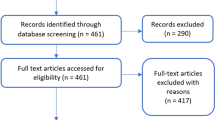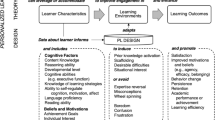Abstract
The Advanced Instructional Design Advisor is an Air Force project which involves the development and testing of automated instructional design guidance for use by Air Force technical training specialists in the development of computer-based training (CBT). This paper discusses the particular structure of an experimental instructional design advisor and how it has and will be used as a research platform to guide future efforts in automating instructional design. The experimental system described makes use of automated instructional strategies which can be systematically altered along a number of dimensions (e.g., amount of learner control, use of qualitative feedback during practice, etc.). Such a tool is essential to conduct research in this area, and has the added benefit of facilitating the rapid prototyping of CBT.
Similar content being viewed by others

References
AndrewsD. H. and GoodsonL. A. (1980). A comparative analysis of models of instructional design. Journal of Instructional Development, 3(4), 2–16.
CardS. K., MoranT. P. and NewellA. (1983). The psychology of human-computer interaction. Hillsdale, NJ: Lawrence Erlbaum Associates, Inc.
Carter, J. (1990). The interactive courseware decision handbook. Randolph AFB, TX: HQ ATC Technical Report.
ClarkR. E. (1983). Reconsidering research on learning from media. Review of Educational Research, 53, 445–459.
DerryS. J. and MurphyD. A. (1986). Designing systems that train learning ability: from theory to practice. Review of Educational Research, 56, 1–39.
DickW. and CareyL. (1985). The systematic design of instruction. Glenview, IL: Scott Foresman.
DuchastelP. C. (1990). Cognitive design for instructional design. Instructional Science, 19(6), 437–444.
EngleR. W. and MobleyL. A. (1976). The modality effect: what happens in long-term memory? Journal of Verbal Learning and Verbal Behavior, 15, 519–527.
EysenckM. W. (1982). Incidental learning and orienting tasks. In C. R.Puff (Ed.), Handbook of research methods in human memory and cognition. New York: Academic Press
Friedman, A., Polson, M. C. and Spector, J. M. (1991). Designing an advanced instructional design advisor: incorporating visual materials and other research issues. (Volume 4 of 6). AL-TP-1991-0017-Vol 4, 1–59.
GagnéR. M. (1970). The conditions of learning, (second edition). New York: Holt, Rinehart and Winston.
GagnéR. M. (1985). The conditions of learning, (fourth edition). New York: Holt, Rinehart and Winston.
GagnéR. M. and BriggsL. J. (1979). Principles of instructional design, (second edition). New York: Holt, Rinehart and Winston.
GagnéR. M., BriggsL. J. and WagerW. W. (1988). Principles of instructional design, (third edition). Fort Worth, TX: Holt, Rinchart and Winston.
GardinerJ. M., GardinerM. M. and GreggV. H. (1983). The auditory recency advantage in longer term free recall is not enhanced by recalling prerecency items first. Memory and Cognition, 11, 616–620.
GathercoleS. E. and ConwayM. A. (1988). Exploring long term modality effects: vocalization leads to best retention. Memory and Cognition, 16(2), 110–119.
GeolV. and PirolliP. (1989). Motivating the notion of generic design within information processing: the design space problem. AI Magazine, 10(1), 18–36.
GlaserR. (1989). Expertise and learning: how do we think about instructional processes now that we have discovered knowledge structures? In D.Klahr and K.Kotovsky (Eds.), Complex information processing: the impact of Herbert Simon. Hillsdale, NJ: Lawrence Erlbaum Associates, Inc.
GlenbergA. M. (1984). A retrieval account of the long-term modality effect. Journal of Experimental Psychology: Learning, Memory and Cognition, 10, 16–31.
GlenbergA. M. and SwansonN. G. (1986). A temporal distinctiveness theory of recency and modality effects. Journal of Experimental Psychology: Learning, Memory and Cognition, 12, 3–15.
GuindonR. (1990). Designing the design process: exploiting opportunistic thoughts. Human-Computer Interaction, 5(2,3), 305–344.
HalffH. (1992), Supporting scenario and simulation-based instruction: issues from the maintenance domain. In J. M.Spector, M. C.Polson and D. J.Muraida (Eds.), Automating instructional design: concepts and issues. Englewood Cliffs: Educational Technology Publications (in press).
HammR. M. (1988). Moment by moment variation in experts' analytic and intuitive cognitive activity. IEEE Transactions on Systems, Man and Cybemetics, 18(5), 757–776.
HammondK. R., HammR. M., GrassiaJ. and ReersonT. (1987). Direct comparison of the efficacy of intuitive in analytic cognition in expert judgment. IEEE Transactions on Systems, Man and Cybernetics, 17, 753–770.
HannafinM. J. and PackK. L. (1988). The design, development and evaluation of instruetional software, New York, NY: Macmillan.
Hickey, A. E., Spector, J. M. and Muraida, D. J. (1991). Design specifications for an advanced Instructional Design Advisor (Volumes 1 and 2) (AL-TR-1991-0085). Brooks AFB, TX: Technical Report for the Technical Training Research Division of the Armstrong Laboratory.
HowellW. C. (1984). Task influences in the analytic-intuitive approach to decision-making. Houston, TX: Rice University, Department of Psychology.
Kageff, L. L. and Roberts, E. J. (1989). TIPS: an expert system with the user in mind. Ford Aerospace internal document.
KierasD. E. and PolsonP. G. (1985). An approach to the formal analysis of user complexity. International Journal of Man-Machine Studies, 22, 365–394.
KozmaR. B. (1991). Learning with media. Review of Educational Research, 61(2), 179–211.
Merrill, M. D. (1987). An expert system for instructional design. IEEE Expert, Summer, 25–37.
MerrillM. D., LiZ. and JonesM. K. (1990). Second generation instructional design (ID-2). Educational Technology, 30(2), 7–14.
Muraida, D. J., Spector, J. M. and Dallman, B. E. (1990). Establishing instructional strategies for advanced interactive technologies. Proceedings of the Psychology in the DoD Symposium, USAFA, CO, April, 1990.
PenneyC. G. (1989). Modality effects in delayed free recall and recognition: visual is better than auditory. Quarterly Journal of Experimental Psychology, 41(3), 455–470.
Pirolli, P. (1989). On the art of building: putting a new instructional design into practice. In H. Burns and J. Parlette (Eds.), Proceedings of the 2nd Intelligent Tutoring Systems Research Forum, San Antonio, TX, April, 1989.
PirolliP. and RussellD. M. (1990). The instructional design environment: technology to support design problem solving. Instructional Science, 19(2), 121–144.
RankerR. A. (1990). A computer based lesson development advisor. Educational Technology, 30(3), 46–49.
RieberL. P. (1991). Animation, incidental learning and continuing motivation. Journal of Educational Psychology, 83(3), 318–328.
RouseW. B. and HuntR. M. (1984). Human problem solving in fault diagnosis tasks. In W. B.Rouse (Ed.), Advances in man-machine systems research. Vol. 1, 195–222. Greenwich, CT: JAI Press.
RoweH. A. H. (1985). Problem solving and intelligence, pp. 99–117. Hilsdale, NJ: Lawrence Erlbaum Associates, Inc.
SalomonG. (1985). Information technologies: what you see is not (always) what you get. Educational Psychologist, 20, 207–216.
SannomiyaM. (1984). Modality effect on text processing as a function of ability to comprehend. Perceptual and Motor Skills, 58, 379–382.
SchwartzD. R. and HowellW. C. (1985). Optional stopping performance under graphic and numeric CBT formatting. Human Factors, 27, 433–444.
Spector, J. M. (1990). Designing and developing an Advanced Instructional Design Advisor (AFHRL-TP-90-52). Brooks AFB, TX: Technical Paper for the Training Systems Division of the Air Force Human Resources Laboratory.
SpectorJ. M. and MuraidaD. J. (1991). Evaluating instructional transaction theory. Educational Technology, 31(10), 29–36.
Spector, J. M., Polson, M. C. and Muraida, D. J. (in press). Automating instructional design: concepts and issues. Englewood Cliffs, NJ: Educational Technology.
Tennyson, R. D. (1989). Cognitive science update of instructional systems design models. Brooks AFB, TX: Technical presentation for the AIDA project at the Air Force Armstrong Laboratory (AL/HRTC, formerly AFHRL/IDC).
Tennyson, R. D. (1990). Framework specifications document for an instructional systems development expert system. Brooks AFB, TX: Technical presentation for the AIDA project at the Air Force Armstrong Laboratory (AL/HRTC, formerly AFHRL/IDC).
Tennyson, R. D., Elmore, R. L. and Snyder, L. (1991). Advancements in instructional design theory: contextual module analysis and integrated instructional strategies. Paper presented at the Annual Meeting of the American Educational Research Association, April, 1991, Chicago, IL.
Van Merrienboer, J. J. G., Jelsma. O. and Paas, F. G. W. C. (1991). Training for reflective expertise: a four-component instructional design model for complex cognitive skills. Paper presented at the Annual Meeting of the American Education Research Association, April, 1991, Chicago, IL.
WalkerD. F. and HessR. D. (1984). Instructional software: principles and perspectives for design and use. Belmont, CA: Wadsworth Publishing Company.
WinnW. (1987). Instructional design in intelligent systems: shifts in the designer's decision-making role. Instructional Science, 16, 59–77.
Author information
Authors and Affiliations
Rights and permissions
About this article
Cite this article
Muraida, D.J., Spector, J.M. The Advanced Instructional Design Advisor. Instr Sci 21, 239–253 (1992). https://doi.org/10.1007/BF00128494
Issue Date:
DOI: https://doi.org/10.1007/BF00128494



